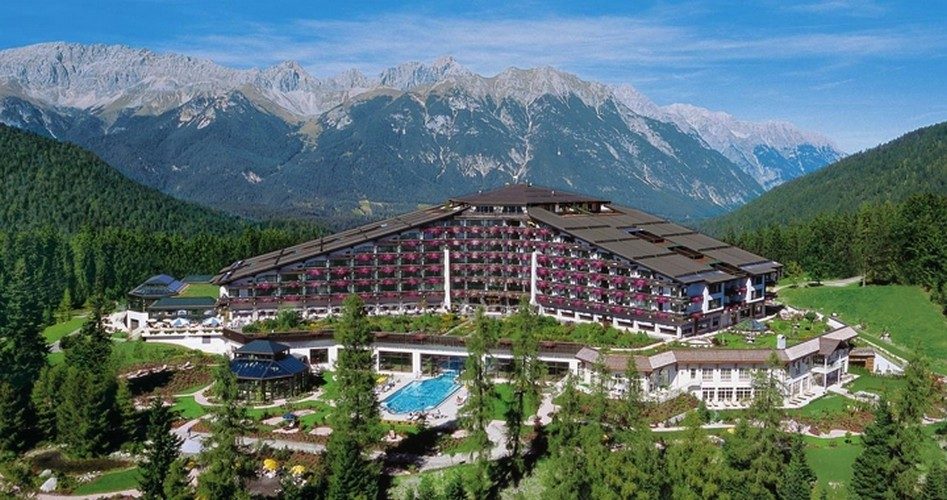
From June 11-14 approximately 140 of the world’s most influential people will gather in Telfs-Buchen, Austria, for the 63rd secretive Bilderberg policy conference, just 16 miles south of the G7 summit.
The invitation-only conclave is where dozens of important Big Business and Big Bank CEOs, heads of governments, and other notables discuss methods to advance the group’s globalist agenda. The attendee list and agenda for this year’s meeting have been released, providing a glimpse into a secret world to which the “have-nots” are not privy.
This year’s list of attendees includes prime ministers from the Netherlands, Finland, and Belgium; the head of NATO, Jens Stoltenberg; and the president of Austria, Heinz Fischer. U.K. Chancellor George Osborne will also be in attendance, along with his former Labour rival Ed Balls and BBC Trust chairman Rona Cameron.
HSBC (Hongkong & Shanghai Banking Corporation) and Goldman Sachs will both send repesentatives to this year’s conference, as will a number of other firms including JP Morgan and the Royal Bank of Canada.
The Guardian notes the “growing presence” of Google at Bilderberg as well:
The company’s executive chairman, Eric Schmidt, is on the group’s steering committee; he’ll be joined in Austria by his vice-president for engineering, advanced technology and projects, and the vice-president of engineering for the not-at-all terrifying sounding Google DeepMind. They, presumably, will be leading the session on artificial intelligence. This will be listened to with great interest by Peter Thiel, the founder of PayPal and director of Facebook, as he continues his quest to merge with computers.
Former DARPA (Defense Advanced Research Projects Agency) director and now Google executive Regina Dugan, who will also be in attendance, gained notoriety in 2013 when she told an audience at All Things D11 Conference that DARPA was working on ingestible ID chips.
The purposely vague agenda for this year’s meeting includes “Artificial Intelligence, Cybersecurity, Chemical Weapons Threats, Current Economic Issues, European Strategy, Globalization, Greece, Iran, Middle East, NATO, Russia, Terrorism, United Kingdom, USA, and US Elections.”
The legendary secrecy of the Bilderberg policy meetings is evident from the efforts taken to ensure security. As noted by the U.K.’s Independent, national governments of host countries provide police protection. The Independent writes, “This year’s summit starts on Thursday but already a zone around the Interalpen-Hotel Tyrol has been established by Austrian police with security checks on vehicles entering and exiting the area.”
According to Austria’s The Local, this year’s security will be provided by an “elite anti-terrorism squad under the command of Austria’s Interior Ministry.” The paper reports there will be over 2,000 police officers on duty, all at the expense of the taxpayers.
Security is also ramped up to contend with an announced protest march, set for June 13.
In the past, journalists attempting to discover what was happening inside these meetings have been arrested. Likewise, there are no minutes taken at the conference, or reports released in reference to any policies discussed.
Interestingly, mainstream media outlets such as BBC, ABC, Fox, the New York Times, the Associated Press, etc. largely ignore the Bilderberg summits. And any who criticize the secrecy of these meetings are decried as conspiracy theorists.
Take for example Republican presidential contender Senator Rand Paul. The Daily Beast referenced Paul’s opposition to the Bilderberg Group this past February in an article entitled “Is Rand Paul the World’s Most Gullible Man?” with the subhead, “Underpinning Paul’s worldview is the notion that somewhere there is always a wizard behind a curtain controlling our lives.” In that article, Sam Kleiner wrote:
Though he avoids talking about it now, Paul has repeatedly railed against the Bilderberg Group’s quest for world government, a conspiracy to create a North American Union that would replace the dollar with the Amero currency, and a United Nations effort to take away Americans’ guns.
But just a quick glance at the Bilderberg meeting website reveals that there is nothing innocuous about these gatherings. The “brief history” of the Bilderberg conference, as outlined on the meeting website, provides a rather honest overview of its purpose:
The Bilderberg conference is an annual three-day meeting designed to foster dialogue between Europe and North America. The pioneering meeting grew out of the concern expressed by leading citizens on both sides of the Atlantic that Western Europe and North America were not working together as closely as they should on issues of common interest….
Through the years, the meetings have become a forum for discussion on a wide range of topics — from trade to jobs, from monetary policy to investment and from ecological challenges to the task of promoting international security. In the context of a globalized world, it is hard to think of any issue in either Europe or North America that could be tackled unilaterally. [Emphasis added.]
A number of Bilderberg attendees have been vocal regarding their globalist affinities. The New American’s Alex Newman observed,
Of course, more than a few prominent Bilderberg attendees over the decades have openly stated their goals, often referring to the sought-after planetary regime as the “New World Order.” Bill Clinton, George H.W. Bush, Henry Kissinger, George Soros, and many other top globalists and Bilderberg operatives have used the term regularly in public. While Bilderberg claims people with “diverse” views are invited, there can be no question that such “diversity” does not include proponents of national independence and sovereignty.
Any assertions that the meetings serve merely as a forum for open discussion have been repeatedly undermined by less subtle statements made by Bilderberg participants.
In 1998, for example, Bilderberg attendee Will Hutton, a former British newspaper editor and pro-EU fanatic, alluded to the influence of the meetings when he wrote, “[Bilderberg] is one of the key meetings of the year. The consensus established is the backdrop against which policy is made worldwide.”
Years later, in 2001, former British Chancellor of the Exchequer and Bilderberg bigwig Denis Healey told the U.K. Guardian that it was a little “exaggerated, but not wholly unfair” to state that the overall goal of the conference was to impose a global government. “Those of us in Bilderberg felt we couldn’t go on forever fighting one another for nothing and killing people and rendering millions homeless,” he claimed. “So we felt that a single community throughout the world would be a good thing.”
Likewise, as noted by Newman, simple anecdotal evidence suggests that Bilderberg plays a significant role in American politics:
In 1991, for example, a virtually unknown governor from Arkansas attended. Shortly after that, he became President Clinton. Obama, too, went to Bilderberg before becoming president.
Attendance at the Bilderberg conference boosted Tony Blair’s career as well, as he became prime minister shortly after attending one of the meetings. Newman noted, “Other countries in Europe have faced similar occurrences, such as Bilderberg bigwig and Goldman Sachs operative Mario Monti being installed as the unelected prime minister of Italy in 2011.”
Photo of Interalpen-Hotel Tyrol in Telfs-Buchen, Austria; location of 2015 Bilderberg conference



